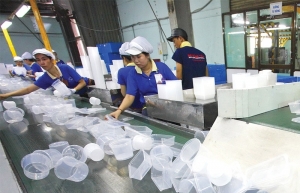Movement underway to promote EPR
 |
| Up to $120 billion of plastic packaging is lost from the global economy each year due to lack of recycling |
A list of 24 units qualified and capable of performing recycling for various products was announced by the Ministry of Natural Resources and Environment (MoNRE) last month as a solution to overcome difficulties for manufacturing and importing enterprises in finding and approaching recycling partners.
Among the selected packaging recyclers is DUYTAN Recycling, which owns one of the most modern and large-scale plastic recycling factories globally.
A feature of the company lies in its “bottle to bottle” technology from Europe. Every used plastic bottle will be recycled into plastic pellets to produce new bottles, contributing to reducing the use of fossil raw materials.
“If previously, plastic bottle products only had one life cycle, now it has increased 50 times. This is a big step forward for the recycling industry,” said Le Anh, director of Sustainable Development at DUYTAN Recycling.
The company currently owns a recycling factory with an area of 65,000sq.m in the Mekong Delta province of Long An, with a production capacity of up to 30,000 tonnes of plastic per year.
In phase two, the company will increase annual processing capacity to 60,000 tonnes of plastic, equivalent to 4.6 billion water bottles being recycled. This is deemed useful as many businesses are looking for reputable recycling units, capable of meeting high recycling needs and ensuring compliance with quality requirements according to extended producer responsibility (EPR) regulations.
“EPR is an opportunity for businesses to see the market and potential of the recycling industry, thereby increasing investment in modern machinery and technology to achieve recycling efficiency and bring more value,” said Anh.
The 2020 Law on Environmental Protection stipulates that manufacturers and importers are required to carry out EPR responsibilities from the beginning of 2024 with two options: self-organising recycling or paying into the Environmental Protection Fund for recycling support.
Businesses in manufacturing and importing batteries, lubricants, tyres, and packaging are the first to comply with the mandatory recycling rate of 5-22 per cent. Current rules give manufacturers and importers the right to decide on the packaging recycling forms such as doing it themselves, hiring a recycling unit, or authorising intermediary organisations.
Hua Phu Doan, vice president of the Vietnam Waste Recycling Association, said that Vietnam’s recycling industry was still very nascent and lacked good waste management facilities, so recycling is mostly carried out in craft villages, causing serious environmental pollution.
“The recycling industry is still weak and has low profitability, while it requires large investments to change technology and modern machinery,” Doan said. “The list of recycling enterprises with sufficient capacity and conditions will have an impact on recycling facilities in craft villages in Vietnam, prompting the villages to renew, change technology, and comply with environmental laws on recycling.”
According to Phan Tuan Hung, legal director at the MoNRE, Vietnam’s recycling industry is facing an unprecedented development opportunity because enterprises can receive financial resources to support recycling activities as the EPR regulations take effect.
However, only recyclers with effective recycling technology and compliance with environmental laws have the opportunity to receive financial resources from EPR,” Hung said.
Most recycling activities use imported scrap as input materials, and only about 6 per cent of plastic waste generated domestically is recycled, according to the Packaging Recycling Organization Vietnam.
Nguyen Huu Tien, chairman of Hanoi environment group URENCO, said that recycling in Vietnam mainly relied on informal forces such as junk, waste, and recycling villages.
“From collection to recycling, a standard process is needed. We are seriously lacking recycling infrastructure that meets EPR standards, especially factories capable of recycling all types of waste,” Tien said.
Along with supportive policies from the government and opportunities from EPR, Vietnam is also becoming a destination for global recyclers.
In early 2023, German recycler Alba Group signed a cooperation agreement with VietCycle, an enterprise with extensive experience operating in the recycling industry. It is expected that a factory worth $50 million will be built, with a capacity of nearly 50,000 tonnes of plastic per year.
According to a report by the International Finance Corporation and the World Bank, plastic packaging worth $80-120 billion per year is lost from the global economy due to not being recycled.
It is estimated that Vietnam wastes nearly $3 billion per year because it does not recycle all plastic waste, while organic waste is estimated to waste more than $30 billion a year as nearly 70 per cent fail to be recycled.
 | Businesses take easy EPR compliance route Many businesses are wrestling over the decision to pay emissions fees or organise recycling themselves, even though extended producer responsibility regulations have already been in effect for a couple of months. |
What the stars mean:
★ Poor ★ ★ Promising ★★★ Good ★★★★ Very good ★★★★★ Exceptional
Related Contents
Latest News
More News
- Ho Chi Minh City launches plan for innovation and digital transformation (February 25, 2026 | 09:00)
- Vietnam sets ambitious dairy growth targets (February 24, 2026 | 18:00)
- Masan Consumer names new deputy CEO to drive foods and beverages growth (February 23, 2026 | 20:52)
- Myriad risks ahead, but ones Vietnam can confront (February 20, 2026 | 15:02)
- Vietnam making the leap into AI and semiconductors (February 20, 2026 | 09:37)
- Funding must be activated for semiconductor success (February 20, 2026 | 09:20)
- Resilience as new benchmark for smarter infrastructure (February 19, 2026 | 20:35)
- A golden time to shine within ASEAN (February 19, 2026 | 20:22)
- Vietnam’s pivotal year for advancing sustainability (February 19, 2026 | 08:44)
- Strengthening the core role of industry and trade (February 19, 2026 | 08:35)

 Tag:
Tag:



















 Mobile Version
Mobile Version